Wedding
![]()
This article is about the event - for other meanings, see Wedding (disambiguation).
Depending on the respective religious, legal and cultural framework conditions of a society, marriage - also wedding, marriage, nuptials or marriage ceremony - comprises manifold social and private law contracts, religious and secular rites, ceremonies and wedding customs as well as accompanying celebrations at the beginning of a marriage. Marriage establishes extensive social and economic rights and obligations between the partners thereby joined and their families, descent groups, or clans. The wedding ceremony functions to confirm the legitimacy of the relationship, to secure mutual care as well as the legitimacy of any offspring conceived within the marriage; in many cultures, marriage conditions their birthrights. The wedding can be considered a rite of passage for the bride and groom. In many cultures, wedding ceremonies involve a ritual exchange of goods or services (such as dowry, bride price, bride gift, bride book, bride service, morning gift).
![]()
The article is still missing the following important information:
Unfortunately, nothing at all about weddings outside the Christian-influenced European area. How do Hindus, Buddhists, Daoists marry?
Help Wikipedia by researching and adding them.
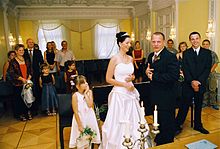
Wedding couple in the registry office (Märchenvilla Eberswalde, 2005)
.jpg)
Noble wedding party (painting by Wolfgang Heimbach, 1637)
Word History
While the words bride and groom can already be traced back to the early Middle Ages, the words Heirat, Vermählung and Hochzeit only appeared in the High Middle Ages. It was not until the 21st century that the term "partnering" (in a registered partnership) came into being.
Marriages in the Christian area
Wedding
According to the German dictionary of the Brothers Grimm (from 1838), the word Trauung comes from Treue, as in faithfulness to a contract, and from Vertrauen, as in the trust of the bride and groom in each other. It acquired its fullness of meaning early on for the personal act of trust between bride and groom, the ceremony as well as the legal act of marriage. The term marriage ceremony has been documented since about the 13th century and originally meant the "entrusting" of a woman to her husband. Today, it primarily refers to the ritual of marriage as such, including in the form of a church wedding or other religious ceremony. The marriage ceremony is the act by which the marriage is begun. A distinction is made between a civil marriage, a church wedding and a free marriage, whereby the latter two have no legal significance.
Church wedding
→ Main article: Church wedding
Roman Catholic Church
See also: List of changes brought about by the liturgical reform: Celebration of the marriage ceremony
Due to the separation of church and state in Germany, Austria, Switzerland, France, Sweden and certain other countries, church marriage is only relevant under church law. In the United Kingdom, Ireland, Spain, Poland, Italy and countries with state churches (such as Greece and Denmark), church marriage is also valid under civil law.
In most denominations, marriage can only be between a man and a woman. Where it is necessary (as in Germany until the reform of the Personal Status Act), the couple must already be married in a civil ceremony (see prohibition of religious pre-marriage). According to the teachings of the Catholic Church, the bride and groom administer the sacrament of marriage to each other, and this is only validly accomplished with the assistance of a cleric at the marriage ceremony (see Council of Trent, Sessio XXIV). The Protestant Church understands the church wedding as a service on the occasion of the marriage that has already taken place, in which the marital union is placed under God's word and blessing. The church wedding takes place almost exclusively in church rooms. There are exceptions where another location (such as outdoors) is approved. If one does not marry in one's own parish, one needs the approval of the priest in charge, who must grant a dimissoriale.
Catholic weddings usually take place in the context of a Holy Mass with Eucharistic celebration, in which the bridal couple also receive communion together.
In principle, a church wedding requires that both spouses belong to a church and that one partner is a member of the denomination in whose church the wedding is to be performed. In the case of partners of different denominations, it is up to the pastor or the local church leadership to decide whether the couple can still be married. If a Catholic does not wish to marry a non-Catholic partner in a Catholic wedding ceremony, but in the rite of another denomination or, in the case of marriages with non-Christians, only in a civil ceremony, he or she must obtain a dispensation from the bishop from the local parish priest.
If one of the partners is Catholic or Protestant and both wish a so-called "ecumenical wedding", the registration takes place at both parish offices. Depending on which of the two churches the wedding is to be performed in, a priest of the other denomination will be asked to assist. In the Protestant Church, therefore, an "ecumenical wedding" is a Protestant wedding with the assistance of a Catholic minister - and vice versa. (An exception applies to the area of the Archdiocese of Freiburg and the Protestant Regional Church in Baden, where the possibility of an ecumenical wedding according to Form C exists).
Many customs associated with church weddings have no Christian roots. The bridal veil and wedding rings originate from Jewish tradition; the latter, however, as a symbol of unbreakable fidelity, became part of the Christian wedding liturgy already in Roman times. The wedding kiss has its origin in Roman contract law and does not occur at all in the Christian liturgy. White wedding dresses came into vogue worldwide after the British Queen Victoria was married "all in white" in 1840 with great public participation. No mere custom, but of fundamental importance in canon law, on the other hand, is the consummation of marriage on the wedding night. Since the Catholic Church has laid down in its law (Codex Iuris Canonici) the primary purpose of marriage as the production and upbringing of offspring, a marriage in the full sense of canon law only exists when sexual intercourse has also taken place between the spouses.
Protestantism
His dissenting view of marriage is one of the most important reasons why Martin Luther distanced himself from the Roman Church. Thus, in addition to producing children and channeling sexual desire, marriage in Protestantism centrally also has the purpose of providing man with a companion and helpmate. Since marriage is nowhere described in the New Testament as a divine act of grace, Luther doubted its sacramental status.
The details of the wedding rite may differ between different denominations and also from congregation to congregation; however, as in the Catholic Church, in a Protestant wedding ceremony the establishment of the marriage consensus in front of the priest and witnesses is central (word of consent, marriage vows).
Orthodox churches
In the Orthodox churches, marriage is considered a sacred mystery, roughly equivalent to the Catholic sacrament. The basis of the Orthodox position on marriage is Ephesians 5:21-33 EU, where the relationship of husband and wife is equated with the relationship between Christ and the Church: Just as Christ gives himself wholly to the Church, so the husband is to live wholly for the wife; just as the Church submits to Christ, so the wife is to submit to the husband. The core of the Orthodox rite is the crowning of the bride and groom by the priest; here the crown has a double symbolic meaning: on the one hand, it stands for the following of Jesus, which the couple who give themselves to each other take up (in his martyrdom Christ wore the crown of thorns), but on the other hand it also refers to Christ's kingdom, in which the bride and groom participate through their devotion. In the Orthodox theology of marriage, the wedding at Cana (Jn 2:1-12 EU) also has a greater significance than in Catholicism, for Christ's presence and miraculous working is understood here as lifting the basically everyday fact of a marriage out of the profane and sanctifying it. Accordingly, the function of the priest is central in the Orthodox rite of marriage: his blessing alone establishes the marriage. Unlike in Catholicism and Protestantism, marriage in the Orthodox Churches does not have the character of a contract between the bride and groom; that is why they do not give each other an "I do" or vow in the ceremony.
Church blessing and marriage of same-sex couples
→ Main article: Blessing of same-sex couples
→ Main article: Church wedding#Sanctification/marriage of same-sex couples.
In many Christian churches, same-sex couples can now marry fully, and in others, blessing services are possible; the latter depends, among other things, on whether the local pastor is willing to perform a blessing. For details, see the main articles above.
Civil wedding
→ Main article: Civil marriage
According to German family law (a branch of civil law), the marriage ceremony is the legal transaction by which a marriage is established. The marriage is a contract requiring form: the declarations of intent must be made before a registrar. Mayors can also perform marriages if they have been appointed registrars by their local council. This is handled differently in the various federal states. In Bavaria, for example, this is common practice without further requirements, in Saxony, for example, only in isolated cases and only if the mayor has acquired the relevant qualification and taken the same examination as all registrars. Substitution is inadmissible. In the interest of legal certainty, the consequences of deficiencies in knowledge or will are specifically regulated so that the general provisions, in particular on contestation, are superseded.
In many countries (such as Germany, Switzerland and Austria), only civil marriage is binding under civil law. This is a purely formal matter without a big ceremony. Since in Germany however ever more pairs marry only civil, many municipalities offer accordingly large premises for the entire wedding company. Wedding customs such as rice throwing then take place in front of the registry office. As a rule, civil marriage ceremonies may only be held in public buildings. Registration is usually done at a registry office in the municipality where the residence is registered. For the registration papers are necessary, like a valid identity card, excerpt from the birth book, family book copies with possible premarriages and a certificate of residence of the main domicile. In most cases, this can also be done in other suitable establishments in the same country. In addition to normal business hours, many registry offices also offer the possibility of a wedding ceremony on Saturday.
In some countries (e.g. Germany or Denmark), civil marriage is also open to homosexual couples. In Switzerland, however, homosexual couples can register their partnership, which is equivalent to marriage in many respects. Formally, however, this is not a marriage ceremony, but a certification of the partnership (Art. 75i ZStV).
See also: Same-sex marriage and civil partnership law
Free wedding ceremony
A free wedding ceremony is a private ceremony that takes place independently of a church or civil ceremony. It offers couples without or of different denominations, same-sex couples, but also all other couples the opportunity to individually design a solemn wedding ceremony with any elements. In Germany and Switzerland, free weddings are not binding under either church or civil law.
Free wedding ceremonies are offered by freelance theologians, secular humanist ceremonial speakers, and freelance wedding speakers, but can also be performed entirely on your own.
Situation outside the German-speaking area
In many countries, the religious ceremony simultaneously establishes the civil marriage. In the United States, for example, not only local government employees (registrars), but also rabbis, church officials, imams and justices of the peace are entitled to perform marriage ceremonies that are fully binding under civil law. In some American states, e.g. California, it is even possible to temporarily grant a marriage license to any private individual. The situation is similar in the United Kingdom, where, in addition to priests and local authority employees, members of Humanists UK and freelance service providers (wedding celebrants), among others, are also authorised to marry. In many other countries of the world (e.g. Israel, Vatican City State), however, marriage requires a religious ceremony in every case.
Secular customs in the Christian cultural area
→ Main article: Wedding custom
Around the Christian marriage in the Western world there are numerous wedding customs, some of them very old, which have little to do with the religious core of the marriage. The Polterabend or Walgerabend on the eve of the wedding, for example, is already documented in the late Middle Ages. The expression "honeymoon" for the period during which the newlyweds are intensely in love can be traced in German from at least the 16th century. Celebrating marriage anniversaries such as golden wedding anniversaries became common in middle-class families at the latest in the late 18th century. Honeymoons have been documented in the German-speaking world since at least the middle of the 19th century, although this custom, as a further development of the Grand Tour, was initially typical above all for bourgeois artists.
Wedding Anniversaries
→ Main article: Wedding day
It is customary for a certain length of marriage to be celebrated with a renewed celebration. The best known of these anniversaries are the "silver wedding" after 25 years and the "golden wedding" after 50 years as well as the diamond wedding after 60 years. Other anniversaries and their meanings vary depending on the region. Very rarely occurs the so-called grace wedding, where the couple is married 70 years.
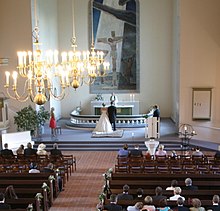
A Protestant wedding in Finland
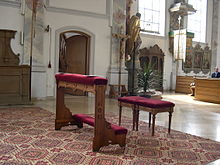
Kneeling bench and chairs for a church wedding (Unterallgäu, 2007)
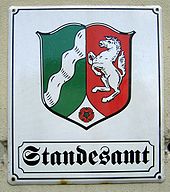
Official sign in NRW
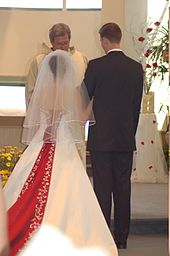
American couples can sign their civil marriage papers at the priest's office.
.jpg)
An Orthodox wedding in the Czech Republic
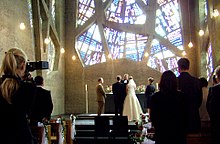
Protestant wedding ceremony in Cologne (Reformation Church in Cologne-Bayenthal, 2007)
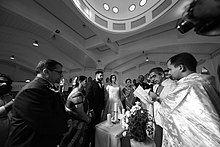
A Catholic wedding in India
Questions and Answers
Q: What is a wedding?
A: A wedding is the ceremony in which two people become married.
Q: Who typically gets married at a wedding?
A: Most weddings involve a man (the bridegroom) and a woman (the bride).
Q: What usually happens during a wedding ceremony?
A: During the ceremony, there is usually an exchange of marriage vows by the couple, presentation of a gift, and a public proclamation of marriage by an authority figure or celebrant.
Q: Are same-sex weddings legal in some places?
A: Yes, same-sex weddings are legal in some places.
Q: Do couples typically exchange rings during the ceremony?
A: Yes, it is common for couples to exchange rings during the ceremony.
Q: Where are most weddings held? A: Weddings are often held in religious buildings or other sites such as gardens or the home of the bride's parents.
Search within the encyclopedia